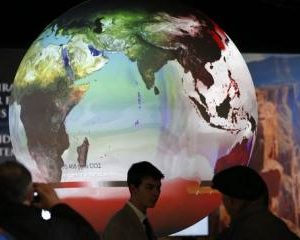By Simon Roger, LeMonde
This piece was originally published in French on Le Monde.
BINGO, for Business and Industry NGO, is, in French, “non-governmental organizations in business and industry.” With such an acronym, it’s no wonder some voices are wondering about the jackpot that could benefit the economic players present in the climate negotiations! The issue of the presence of lobbyists is in any case taken very seriously by the delegates of the UN Framework Convention on Climate Change (UNFCCC) meeting in Bonn, Germany, in working session until May 18.
For the first time in more than 20 years of multilateral meetings, the 196 UNFCCC member States officially addressed the subject at a nearly five-hour “workshop” on Tuesday, May 9. That term is important because the UN institution presented the meeting as an exchange of views that was by no means conclusive. “We are not here to negotiate anything but to have a conversation,” warned session chairman Tomasz Chruszczow, opening this session in the hemicycle of the World Convention Center.
Nevertheless, it is indeed a negotiation that takes place, between countries and organizations with contradictory positions and sharp arguments. A summary of Tuesday’s meeting should be sent to delegates on Friday, May 12, to guide further discussions. From the 1992 Rio summit, BINGOs are one of the nine non-state actors to be included in climate conferences (the COPs), along with environmental NGOs, local experts, indigenous peoples, research unions, feminist and gender organizations, youth movements, and farmers. They show an exponential growth: with 163 at COP1 (in Berlin in 1995), these various non-state entities numbered more than 2,000 at COP22 in Marrakech in November 2016.
« OPEN ALL DOORS »
If they do not have the right to vote on decisions – the prerogative reserved to the states – they have observer status which allows them to speak in plenary, to follow the debates of the negotiating groups and to organize events during COPs. “Hundreds of trade associations have access to climate negotiations, and many of them are funded by some of the world’s largest polluters and climate skeptics,” said Tamar Lawrence-Samuel, from the US-based NGO Corporate Accountability International. “They represent the main obstacle to raising the level of ambition of action against global warming.”

In a report released on May 2, the Boston-based NGO profiles the lobbying groups it considers the most errant. The US Chamber of Commerce is funded by the ExxonMobil, Chevron and Peabody Energy groups, one of whose priorities for 2017 is to increase the production of fossil fuels. There is also the Business Roundtable, representing the major oil companies, which is favorable to drilling, mining and hydraulic fracturing, activities that emit high greenhouse gas emissions. The report also profiles the Business Council of Australia, a fierce opponent of an Australian carbon tax.
“Some of the companies suspected of polluting political action will provide the biggest and best solutions [against global warming],” the representative of Australia said during the talks. At the previous session of the UNFCCC, in May 2016, the country had applied pressure, bringing with it the “umbrella group” (a coalition representing Australia alongside the United States, Canada, and Russia) to stop the discussion that had begun on conflicts of interest.
Building on the example of the World Health Organization, which, in the name of defending public health, put an end to the tobacco industry’s interference tactics, Corporate Accountability International, supported by a heterogeneous coalition around Ecuador, from emerging countries, and from China and India, invites negotiators to follow the same path and establish a transparent process for the admission of observers. This system would ensure that actors act for the protection of the planet and not the promotion of private interests. As for the worst polluters, “kick them out,” says the American NGO.
“This measure would be counterproductive and backwards. In the face of the climate emergency, we need to open all doors,” says Norine Kennedy of the United States Council for International Business. This private sector official refutes the accusations of collusion others have attached to certain BINGOs.
« DISCREET DISCUSSIONS »
“Their degree of influence on the negotiations is difficult to assess,” admits Sébastien Duyck, a lawyer at the Center for International Environmental Law in Geneva. “Discussions are discreet, there is no register to identify the interlocutors who have intervened in a particular meeting.”
“The influence of lobbyists is not built in the corridors of the UNFCCC,” said a negotiator who wished to remain anonymous. “It is forged in the relationships of power that these industry representatives impose upstream, in their respective countries.”
The Paris agreement, concluded at COP21 at the end of 2015, reinforced the role of these groups in the negotiations. “Since the efforts of the States will not be enough to contain the warming below the 2°C threshold, the Paris text invites the parties to develop maximum synergies,” analyzes Amandine Orsini, professor of political science at the University of Saint-Louis in Brussels. “Non-state actors are well suited to play this role because they operate in a network.”
For Orsini, the initiative launched in Bonn is unlikely to succeed. If the UNFCCC succeeds in imposing a code of conduct – bold betting in a forum where any decision requires a consensus of the 196 member states – it may “shoot itself in the foot. Who other than large industrial groups can finance, on a large scale, new technologies that climate policies need?”







